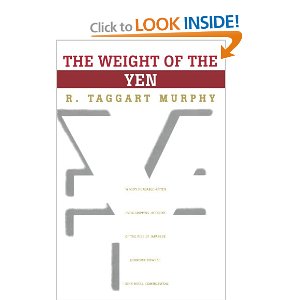 FT column by Gillian Tett says to read journalist-cum-banker Taggart Murphy's history of the yen to understand the way ahead on the renminbi, also considered to be held to artificially low value by its government.
FT column by Gillian Tett says to read journalist-cum-banker Taggart Murphy's history of the yen to understand the way ahead on the renminbi, also considered to be held to artificially low value by its government.
But what caused the trade imbalance, argues Murphy was: 1) the US Fed deficit structurally built into the body politic by Reagan, and 2) the Japanese "development state" system of national leverage, centralized credit allocation and credit risk socialization (the govs stood behind banks).
That's all ancient history now, and Japan's gov today intervenes to weaken the strong yen.
Tett says just read the book and swap out Japan for China and it all makes sense all over again.
This has been my argument in the brief for a couple of years now--a grand strategic choice by America that enabled export-driven growth in Asia while allowing us to: 1) be a military superpower and 2) ask for no sacrifice from society because money remained so cheap.
How did Japan escape the grind? Not well. (And the same can be said for us today.) Japan worked to spur domestic demand while keeping exports strong, and that paved the way "for a crazy bubble, followed by a bust, and more currency instability in subsequent years."
Murphy's point: "Changing the units of account had not the slightest chance of dealing with these fundamentals. But they made for a more unstable world."
In other words, be careful what you wish for.
This is a consensus argument I find: it's not the pegging that hurts us but the sterilization of the foreign currency won in the process (i.e., China's continued insistence of controlling its allocation in a macro sense).
What went wrong with Japan is that it outgrew the need for central control of capital allocation via a state-dominated banking system. It outgrew that system like a child outgrows shoes, says Tett. But it waited too long to reform the system--the same danger that awaits China, one imagines.
And yet, China claims to be growing up its system as fast as possible. Tett says the pace remains too slow.
Macro lesson of Murphy's book: the twin dangers of rapid revaluation and too slow reforms. In between lies the sweet spot of making capital allocation more marketized and efficient, letting in a reasonable amount of inflation but not too much.
Old story I would add: centralized and authoritarian works for extensive growth under conditions of scarce capital, as centralized allocation allows the state to direct growth. But once the economy matures or "complexifies" sufficiently, the system outgrows the crudity of that initial system and needs the wisdom of crowds larger than can be assembled in one room in Beijing.